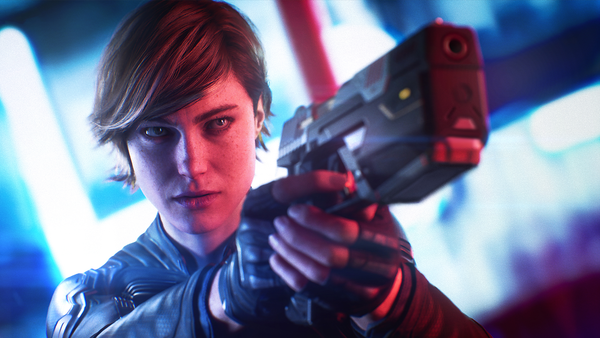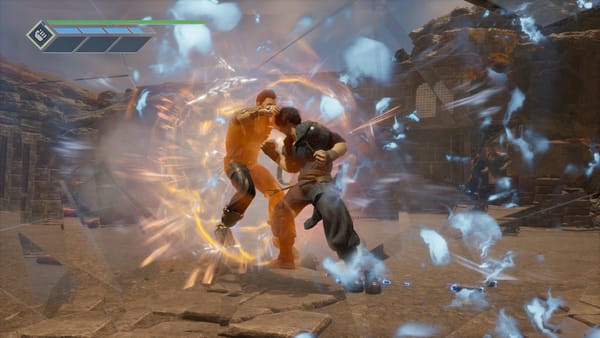#14: The evidence of your eyes and ears
We are hours away from the start of not-E3, and I’m still quietly furious that it is not actual E3, and I am not currently trying to drink away the jetlag in a nice Los Angeles hotel. When we reminisce, we naturally tend to focus on the good stuff, putting the negatives to one side — and if I’m honest, there are plenty of downsides to E3. Indeed, for all the anticipation in the run-up to it, by the end of the week I can’t wait to get out of there.
One thing I definitely won’t miss while watching the festivities from my home office this week is group interviews, or roundtables. Publishers pack a game demo or interview room with multiple members of the media in order to accommodate as many outlets as possible, and try to ensure developers only have to answer the same question 20 times a day, instead of 100.
As a rule, Edge didn’t ‘do’ roundtables. And when accepting an invitation was unavoidable — when there was no alternative, and a game was too important not to cover — I very rarely asked questions. Most, if not all, of the other press in the room were working online, but the next issue of Edge wouldn’t be on sale for weeks. They weren’t going to publish an answer to a question of mine before I did. Besides, I tend to ramble at the best of times. Throw in jetlag and a hangover and I’ll take up the entire Q&A without even asking a question, let alone getting an answer for you to steal.
Still, roundtables are not entirely without merit: for one, you get to bear witness to some spectacularly terrible questions. I still cannot understand why someone would fly halfway round the world to ask a developer how many guns are in their game, how many polygons are in the protagonist’s character model, or what the DLC plan is. A friend once overheard a young journalist say: ‘Tell me, how come your game is so awesome?’ (You will not be surprised to hear the interviewer has long since hopped the fence to work in PR.) The best of the lot comes from my friend Keza MacDonald of The Guardian, who once sat in a roundtable presentation for Clover Studio’s Okami, and bore witness to the greatest interview question ever asked: ‘If he is dog, how he can open treasure chest?’
Most of those stories are years old, however. Despite what some observers, and most YouTubers, would have you believe, the overall standard of game journalism today is higher than it has ever been, and the quality of questioning has, by and large, risen in kind. Yet those across the table seem to be struggling to adjust. They come prepared to talk about how many guns are in their game, and seem caught off balance when the interviewer is more interested in why you’re shooting people than how.
I mention all this because EA announced Battlefield 2042 yesterday, which takes as its setting a near-future war in a world ravaged by a climate crisis and being fought over by displaced populations. When asked by IGN about the fairly obvious social commentary underpinning that thematic construct, design director Daniel Berlin claimed no such intention, adding that the setting was chosen “for gameplay reasons across the board”. Oh good. This again.
This is not the fault of the creative directors, exec producers and design leads that keep ending up in the headlines for downplaying the obvious political connotations of their modern-day games about killing people in dystopian wars. Rather it is the fault of the noisy minority online that wants to keep politics out of games, ignoring the fact that it is decades too late to make that argument, and of the marketing and publishing folks who are terrified of harming sales by acknowledging the bloody obvious. I assume there is a fairly basic calculation being done here: for so long as the fallout from lying is deemed less damaging than that of telling the truth, the lie will always win. Now there’s a political statement for you.
I suppose I can see the logic: I expect I’d take a few days of bad headlines over six months of death threats too, given the choice. But I do have some questions. Is there really, in the highly paid ranks of videogame marketing executives, not one single mind capable of coming up with a more elegant, insightful response to this line of questioning? How do developers feel about being sent out to make themselves look like clowns every time a game about guns gets announced? And would it not benefit the medium, the industry and the whole miserable discourse around them to talk honestly, and openly, about the contextual undertones of our biggest blockbusters?
I suspect I’ll be waiting a while for decent answers to any of that. Perhaps it’s just a matter of how we ask the question; maybe, if we put it in terms that developers are more comfortable with, we’ll get a decent response. So: if he shoot gun, how he is not political?
MORE!
Battlefield 2042 has also reignited the discussion around pricing: the new-gen versions will be more expensive, pushing the UK release up to £70. I’ve been sort of okay with firstparty PS5 games launching at this price because none of them have tried to eke more money out of me through microtransactions and all that guff. EA being EA, I assume that is about to change.
Stanley Pierre-Louis, the excellently named president of E3 organisers the ESA, hopes for a return to a predominantly physical event next year. Don’t we all. This is a decent interview: dry, but oddly fascinating in how the head of a trade body, who represents a huge assortment of enormous companies and has to be very, very careful about what he says, manages to walk a dozen different tightropes in the face of some potentially awkward questioning. Good work all round.
The logical consequence of footballers repurposing Fortnite dances as goal celebrations: footballers in Fortnite, ahead of the start of Euro 2020 this weekend. Harry Kane seems an odd choice, I must say. You’ll be doing well, heading towards the final circle, when your avatar’s ankles suddenly collapse.
Not-E3 kicks off, sort of, this evening with the Summer Games Fest, brainchild of Everywhere’s Geoff Keighley. Joining the festivities will be Japanese Breakfast, whose new album ‘Jubilee’ has been a tremendous aid in the making of Hit Points this week, and Weezer, whose new album has not.
Once again, thanks so much for reading. If you’ve enjoyed this, do please share it around — either on socials by using the button below, or by simply forwarding the mail to anyone you think might like it. And if you haven’t signed up yet, please do so! Catch you tomorrow.





